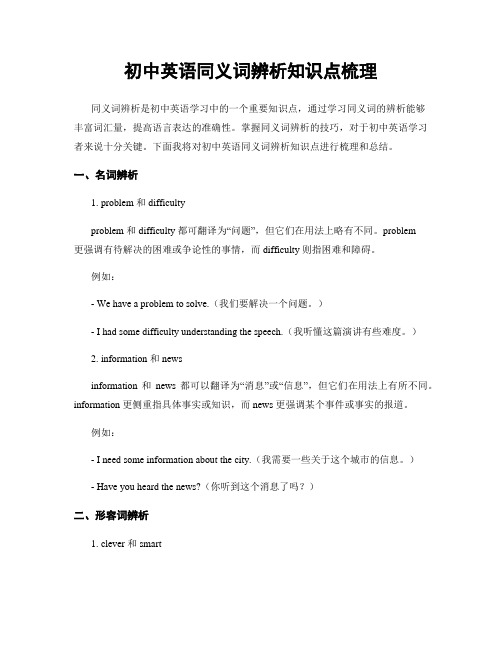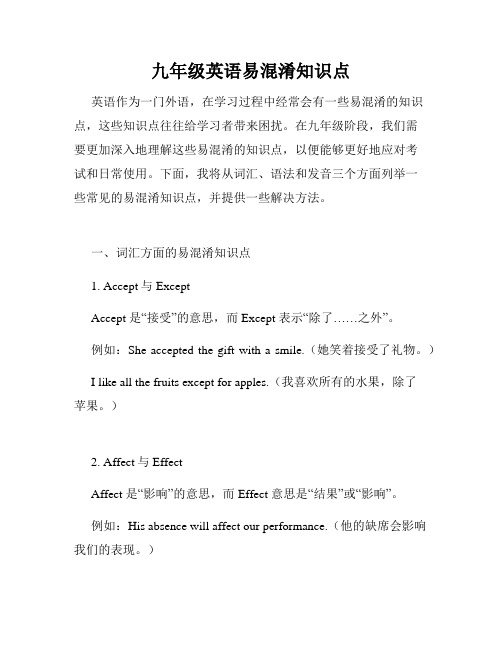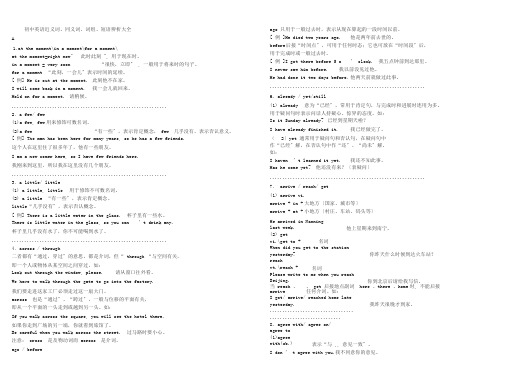(完整版)初中英语中考易混易错同义词辨析大全
初中英语同义词辨析知识点梳理

初中英语同义词辨析知识点梳理同义词辨析是初中英语学习中的一个重要知识点,通过学习同义词的辨析能够丰富词汇量,提高语言表达的准确性。
掌握同义词辨析的技巧,对于初中英语学习者来说十分关键。
下面我将对初中英语同义词辨析知识点进行梳理和总结。
一、名词辨析1. problem 和 difficultyproblem 和 difficulty 都可翻译为“问题”,但它们在用法上略有不同。
problem更强调有待解决的困难或争论性的事情,而 difficulty 则指困难和障碍。
例如:- We have a problem to solve.(我们要解决一个问题。
)- I had some difficulty understanding the speech.(我听懂这篇演讲有些难度。
)2. information 和 newsinformation 和news 都可以翻译为“消息”或“信息”,但它们在用法上有所不同。
information 更侧重指具体事实或知识,而 news 更强调某个事件或事实的报道。
例如:- I need some information about the city.(我需要一些关于这个城市的信息。
)- Have you heard the news?(你听到这个消息了吗?)二、形容词辨析1. clever 和 smartclever 和smart 都可以翻译为“聪明”的意思,但它们在用法和意义上有所差别。
clever 强调智力明晰,能够快速理解和解决问题,而 smart 则更侧重于外表和衣着得体。
例如:- He is a clever student who always gets good grades.(他是个聪明的学生,总是取得好成绩。
)- The boy looks smart in his new suit.(这个男孩穿上新衣服看起来很帅气。
)2. interesting 和 excitinginteresting 和 exciting 都可以翻译为“有趣”的意思,但它们在用法上有所区别。
九年级英语易混淆知识点

九年级英语易混淆知识点英语作为一门外语,在学习过程中经常会有一些易混淆的知识点,这些知识点往往给学习者带来困扰。
在九年级阶段,我们需要更加深入地理解这些易混淆的知识点,以便能够更好地应对考试和日常使用。
下面,我将从词汇、语法和发音三个方面列举一些常见的易混淆知识点,并提供一些解决方法。
一、词汇方面的易混淆知识点1. Accept与ExceptAccept 是“接受”的意思,而Except 表示“除了……之外”。
例如:She accepted the gift with a smile.(她笑着接受了礼物。
)I like all the fruits except for apples.(我喜欢所有的水果,除了苹果。
)2. Affect与EffectAffect 是“影响”的意思,而Effect 意思是“结果”或“影响”。
例如:His absence will affect our performance.(他的缺席会影响我们的表现。
)The medicine had a positive effect on her health.(这种药对她的健康有积极的影响。
)3. Desert与DessertDesert 是“沙漠”的意思,而Dessert 表示“甜点”。
例如:They took a trip to the desert.(他们去沙漠旅行了。
)I want some ice cream for dessert.(我想要一些冰淇淋当甜点。
)二、语法方面的易混淆知识点1. Much与ManyMuch 用于不可数名词,而Many 用于可数名词。
例如:He has much experience in this field.(他在这个领域有很多经验。
)There are many books on the shelf.(书架上有很多书。
)2. It's与ItsIt's 是 It is 或 It has 的缩写形式,而Its 是“它的”的意思。
初中英语常用同义词辨析(1-10)

初中英语常用(chánɡ yònɡ)同义词辨析(1-10) abandon, desert, forsake, leave, give up这些动词或词组均含“抛弃、放弃”之意abandon :强调永远或完全放弃或抛弃人或事物等,这可能是被迫的,也可能是自愿的。
desert :着重指违背法律责任和义务,或自己的信仰与誓言的行为,多含非难(fēi nàn)的意味。
forsake :侧重断绝感情上的依恋,自愿抛弃所喜欢的人或物。
也指抛弃信仰或改掉恶习。
leave :普通用词,指舍弃某事或某一职业,或终止同一某人的关系,但不涉及动机与果。
give up :普通用语,侧重指没有希望或因外界压力而放弃。
ability, capacity, capability, genius, talent, competence, faculty, gift, aptitude这些名词均可表示人的“能力,才能”之意。
ability :普通用词,指人先天的或学来的各种能力。
capacity :侧重指人的潜在能力,通常不指体力,多指才智,尤指接受与领悟能力。
capability :多用于人,指胜任某项具体工作的能力,也指本身具有、尚未发挥的潜在能力。
常与of或for连用。
genius :语气最强,指天赋的高度才能与智力。
talent :着重指人某方面具有可发展和倍养的突出天赋才能,但语意比genius弱。
competence :正式用词,侧重指令人满意的业务能力与水平,达到胜任某项工作等的要求。
faculty :指特殊的才能或智力。
gift :着重个人(gèrén)的天赋的才能或在某方面的显著本领,常暗含不能用一般规律作解释的意味。
aptitude :多指先天或后天习得的运用自如的能力,常暗示接受能力强,能迅速掌握一种学术训练或艺术技巧。
able, capable, competent这些形容词均含有“有能力的,能干的”之意able :最常用词,多用于褒义,着重指多方面的,经常性的,或潜在性的能力。
初中英语同义词辨析复习资料

初中英语同义词辨析复习资料
初中英语同义词辨析复习资料
Ⅰ. begin 开始,是很普通的用语,指开始某一行动或进程,与end 相对。
如:
① Its time to begin work. 是开始工作的时候了。
② She began to work in the factory at the age of fifteen.
她十五岁开始在工厂里工作。
③ The meeting will begin at eight oclock.
会议将于八点钟开始。
Ⅱ. start 开始,往往与begin通用,但它着重于开始或着手这一点,与stop 相对。
如:
① When did you start work? 你什么时候开始工作的?
② He started to study English. 他开始学英语。
③ The child started crying. 小孩哭起来了。
[注]:表示动身;启程;开动(机器)等。
如:
①I think we ought to start at 8. 我认为我们应该8点出发。
另外mence是三词中最正式的',其后接动词时只能接动词的-ing形式。
如:
②The Prime Minister menced speaking 25 minutes ago.
首相是25分钟前开始发言的。
初中英语常用的易混淆同义词辨析(10)

初中英语常用的易混淆同义词辨析(10)•12at the back of :这个前置词短语既可指具体的位置的先后,又可用于指抽象的概念。
四十一、【常用同义词】afterward(s), later这两个副词均有“后来,以后”之意。
afterward(s)与later的不同之处有两点。
1.afterwards指一整段时间之后,一般不分具体时间连用,而later常指一个具体的时间点之后。
2.afterward(s)强调事物的先后顺序,而later侧重“迟、推迟”。
四十二、【常用同义词】age, epoch, era, period, times这些名词均含“时期、时代”之意。
age :常指具有显著特征或以某杰出人物命名的历史时代或时期。
epoch :正式用词,侧重指以某重大事件或巨大变化为起点的新的历史时期。
era :书面语用词,指历史上的纪元、年代,可与epoch和age 互换,侧重时期的延续性和整个历程。
period :最普通用词,概念广泛,时间长短不限,既可指任何一个历史时期,又可指个人或自然界的一个发展阶段。
times :侧重某一特定时期。
四十三、【常用同义词】aggression, invasion, assault, attack, offensive这些名词均有“进攻、侵略”之意。
aggression :词义宽泛,既可指武装入侵别国领土,又可指文化、经济等方面的侵略。
侧重敌意行动和征服的企图。
invasion :多指具体的侵入或侵犯别国领土,也可用于指抽象事件。
assault :主要指突然而猛烈的进攻。
attack :普通用词,含义广,指事先不发警告,主动地向对方发起武力进攻或对言论等进行抨击。
offensive :多指进攻的态势,常指大规模的协同军事行动。
四十四、【常用同义词】ago, before这两个副词均含“……以前”之意。
ago :指从现在起往前推算一段时间,始终置于所修饰的词之后,与一般过去时连用。
中考英语近义词汇及词组辨析

中考英语近义词汇及词组辨析中考英语考试中,近义词汇及词组的辨析是一个很重要的考点。
同学们在备考过程中应该特别注意掌握这些词汇及词组的区别和用法。
本文将为大家介绍一些常见的近义词汇及词组,帮助同学们更好地应对中考英语。
一、accurate与correctaccurate和correct都表示“准确的”。
它们的区别在于:accurate强调准确度的高,而correct则更多地强调符合规范、正确的。
例如:1. The scientist made accurate measurements. (科学家做出了准确的测量。
)2. Please correct your mistakes in the essay. (请在作文中纠正你的错误。
)二、advice与adviseadvice是名词,意为“建议”或“忠告”,而advise是动词,意为“建议”或“提供意见”。
例如:1. Can you give me some advice on how to learn English? (你能给我一些建议如何学习英语吗?)2. I advise you not to be late for the meeting. (我建议你们不要迟到会议。
)三、borrow与lendborrow和lend都与“借”的概念有关,但使用上有所不同。
borrow表示“借入”,lend表示“借出”。
例如:1. Can I borrow your pen? (我能借用你的钢笔吗?)2. Could you lend me some money? (你能借给我一些钱吗?)四、famous与popularfamous和popular都表示“著名的”,但有所不同。
famous更多地指代某个人或事物在广泛的范围内被人所熟知,而popular则更多地指代某个人或事物在大众之间受欢迎。
例如:1. Mozart is a famous composer. (莫扎特是一个著名的作曲家。
人教版九年级英语各单元易混易错词义辨析汇总

Unit1 易混易错词义辨析汇总1、aloud, loud与loudly2、discover与invent3、by, with, in, through与use4、instead与instead ofUnit2 易错易混词义辨析汇总1、dead, die, death与dying2、like, love与enjoy3、bring, carry, fetch与takeUnit3 易混淆单词和短语辨析1、辨析: beside, besides例:The bookstore is on your right, beside the bank.书店在你的右边,银行旁边。
Besides English, we learn Japanese as well.除了英语,我们还学日语。
2、辨析:between, among例:Between the door and the window there is a map. 门和窗户的中间有一张地图。
He sat among the children. 他坐在孩子们中间。
3、辨析:excuse me, sorry, pardon例:Excuse me, may I use your bicycle, Jack?对不起,我可以用一下你的自行车吗,杰克?I’m sorry. I can’t go to the cinema with you this afternoon.对不起。
我今天下午不能和你一起去看电影。
一Answer the question in English.请用英语回答这个问题。
一Pardon?对不起,请再说一遍。
4、辨析:on one’s way to, in a way, by the way, in the way例:I met an old friend of mine on my way to the station.在去车站的途中,我碰见了我的一位老朋友。
初中英语近义词、同义词、词组、短语辨析大全

初中英语近义词、同义词、词组、短语辨析大全A1.at the moment\in a moment\for a moment\at the moment=right now" 此时此刻 ", 用于现在时。
in a moment = very soon “很快,立即〞 , 一般用于将来时的句子。
for a moment “此刻,一会儿〞表示时间的延续。
[ 例] He is out at the moment. 此刻他不在家。
I will come back in a moment. 我一会儿就回来。
Hold on for a moment. 请稍候。
.............................................................2.a few/ few(1)a few, few 用来修饰可数名词。
(2)a few “有一些〞,表示肯定概念,few 几乎没有,表示否认意义。
[ 例] The man has been here for many years, so he has a few friends.这个人在这里住了很多年了,他有一些朋友。
I am a new comer here, so I have few friends here.我刚来到这里,所以我在这里没有几个朋友。
.............................................................3.a little/ little(1) a little, little 用于修饰不可数名词。
(2) a little “有一些〞,表示肯定概念。
little “几乎没有〞,表示否认概念。
[ 例] There is a little water in the glass. 杯子里有一些水。
There is little water in the glass, so you can ’t drink any.杯子里几乎没有水了,你不可能喝到水了。
- 1、下载文档前请自行甄别文档内容的完整性,平台不提供额外的编辑、内容补充、找答案等附加服务。
- 2、"仅部分预览"的文档,不可在线预览部分如存在完整性等问题,可反馈申请退款(可完整预览的文档不适用该条件!)。
- 3、如文档侵犯您的权益,请联系客服反馈,我们会尽快为您处理(人工客服工作时间:9:00-18:30)。
初中英语易混易错同义词辨析大全1. clothes, cloth, clothingclothes统指各种衣服,谓语动词永远是复数, 总称,cloth指布,为不可数名词clothing 服装的指——件衣服用 a piece of, an article of2. incident, accidentincident 指小事件,accident 指不幸的事故He was killed in the accident.3. amount, numberamount 后接不可数名词,number 后接可数名词 a number of students4. family, house, homehome 家,包括住处和家人,house 房子,住宅,family 家庭成员.My family is a happy one.5. sound, voice, noisesound 自然界各种各样的声音,voice 人的嗓音,noise 噪音I hate the loud noise outside.6. photo, picture, drawingphoto用照相机拍摄的照片,picture可指相片,图片,电影片,drawing画的画Let' s go and see a good picture.7. vocabulary, wordvocabulary 词汇,一个人拥有的单词量,word 具体的单词He has a large vocabulary.8. population, peoplepopulation 人口,人数,people 具体的人China has a large population.9. weather, climateweather 一天内具体的天气状况,climate 长期的气候状况The climate here is not goodfor you.10. road, street, path, wayroad具体的公路,马路,street街道,path小路,小径,way道路,途径take this road; in the street, show me the way to the museum.11. course, subjectcourse课程(可包括多门科目),subject科目(具体的学科) a summer course12. custom, habitcustom 传统风俗,习俗,也可指生活习惯,后接to do , habit生活习惯,习惯成自然,后接of doing. I ' ve got the habit of drinking a lot.13. cause, reasoncause 指造成某一事实或现象的直接原因,后接of sth./doing sth , reason用来解释某种现象或结果的理由,后接for sth./doing sth. the reason for being late14. exercise, exercises, practiceexercise 运动,锻炼(不可数),exercises 练习(可数),practice (反复做的)练习Practice makes perfect.15. class, lesson作”课”解时,两者可以替换.指课文用lesson.指班级或全体学生用class. lesson 6; class 516. speech, talk, lecturespeech指在公共场所所做的经过准备的较正式的演说,talk日常生活中的一般的谈话,讲话, lecture 学术性的演讲,讲课a series of lecture on ••17. officer, officialofficer 部队的军官,official 政府官员an army officer18. work, job二者均指工作。
work不可数,job可数 a good job19. couple, paircouple 主要指人或动物,pair多指由两部分组成的东西 a pair of trousers20. country, nation, state, landcountry 侧重指版图,疆域,nation 指人民,国民,民族,state侧重指政府,政体,land 国土,国家The whole nation was sad at the news.21. cook, cookercook 厨师,cooker 厨具He is a good cook.22. damage, damagesdamage 不可数名词,损害,损失;damages 复数形式,赔偿金$900 damages23. police, policemanpolice 警察的总称,后接复数谓语动词,policeman 指某个具体的警察The police are questioning everyone in the house.24. problem, questionproblem 常和困难连系,前面的动词常为think about, solve, raise , question 常和疑问连系,多和ask, answer 连用25. man, a manman 人类,a man 一个男人Man will conquer nature.26. chick, chicken二者均可指小鸡,chicken 还可以当鸡肉The chicken is delicious.27. telegram, telegraph当电报解时,telegram 指具体的,telegraph 指抽象的 a telegram, by telegraph28. trip, journey, travel, voyagetravel是最常用的,trip指短期的旅途,journey 指稍长的旅途,voyage 指海上航行 a three-day trip29. sport, gamesport多指户外的游戏或娱乐活动,如打球,游泳,打猎,赛马等;game指决定胜负的游戏,通常有一套规贝U His favorite sport is swimming.30. price, prizeprice 价格,prize 奖,奖品,奖金win the first prize The price is high/low.31. a number of, the number ofa number of 许多,谓语动词用复数。
the number of ••-的数目,谓语动词用单数。
The number of students is increasing.32. in front of, in the front ofin front of 范围夕卜的前面,in the front of 范围内的前面In the front of the room sits a boy.33. of the day, of a dayof the day 每一天的,当时的,当代的,of a day 暂时的,不长久的 a famous scientist ofthe day34. three of us, the three of usthree of us 我们(不止三个)中的三个,the three of us 我们三个(就三个人)The three ofus---Tom, Jack and I went to the cinema.35. by bus, on the busby bus表手段,方式,不用冠词,on the bus 表范围They went there by bus.36. for a moment, for the momentfor a moment 片亥J, 一会儿,for the moment 暂时,一时Thinking for a moment, he agreed.37. next year, the next yearnext year 将来时间状语,the next year 过去将来时间状语He said he would go abroadthe next year.38. more than a year, more than one yearmore than a year 一年多,more than one year 超过一年(两年或三年等)39. take advice, take the(one ' s) advicetake advice 征求意见,take the advice 接受忠告He refused to take the advice and failed again.40. take air, take the airtake air 传播,走漏,take the air 到户外去,散步We take the air every day.41. in a word, in wordsin a word 总之,一句话,in words 口头上In a word, you are right.42. in place of, in the place ofin place of 代替,in the place of 在…地方A new building is built in the place of the old one.43. in secret, in the secretin secret秘密地,暗自地,偷偷地,一般用作状语;in the secret 知道内情,知道秘密,一般用作表语My mother was in the secret from the beginning.44. a girl, one girla girl 可泛才旨所有女孩,one girl 一个女孩Can one girl carry such a big box?45. take a chair, take the chairtake a chair 相当于sit down 坐下,take the chair 开始开会46. go to sea, by sea, by the seago to sea 当海员,出航,by sea 乘船,由海路,by the sea 在海边go by sea47. the doctor and teacher, the doctor and the teacherthe doctor and teacher 指一个人,既是医生又是老师,the doctor and the teacher 两个人,一个医生和一个老师the doctor and teacher is48. in office, in the officein office 在职的,in the office 在办公室里He is in office, not out of office.49. in bed, on the bedin bed 卧在床上,on the bed 在床上The book is on the bed. He is ill in bed.50. in charge of, in the charge ofin charge of 管理,负责照料,in the charge of 由....... 照料He is in charge of the matter. The matter is in the charge of her.51. in class, in the classin class 在课上,in the class 在班级里He is the best student in the class.52. on fire, on the fireon fire 着火,on the fire 在火上Put the food on the fire. The house is on fire.53. out of question, out of the questionout of question 毫无疑问的, out of the question 不可能的54. a second, the seconda second 又一,再一,the second 第....... He won the second prize.55. by day, by the dayby day 白天,by the day 按天计算The workers are paid by the day.56. the people, a peoplethe people 才旨人,a people 才旨民族The Chinese is a peace-loving people.57. it, oneit 同一物体,one 同类不同一I lost my pen. I have to buy a new one.58. that, thisthat指代上文所提到的,this导出下文所要说的I was ill. That ' s why•••59. none, nothing, no onenone 强调有多少,nothing, no one 强调有没有,nothing 指物,no one 指人---How many /How much ・?--- None.60. anyone, any oneanyone 指人,不能接of, any one 指人物均可,可接of any one of you61. who, whatwho 指姓名或关系, what指职业或地位What is your dad? He is a teacher.62. what, whichwhat的选择基础是无限制的,which 在一定范围内进行选择Which do you prefer, bananas or apples?63. other, anotherother 后接名词复数,another 后接名词单数other students, another student64. not a little, not a bitnot a little 非常,not a bit 一点也不I' m not a bit tired. 我一点儿也不累。
